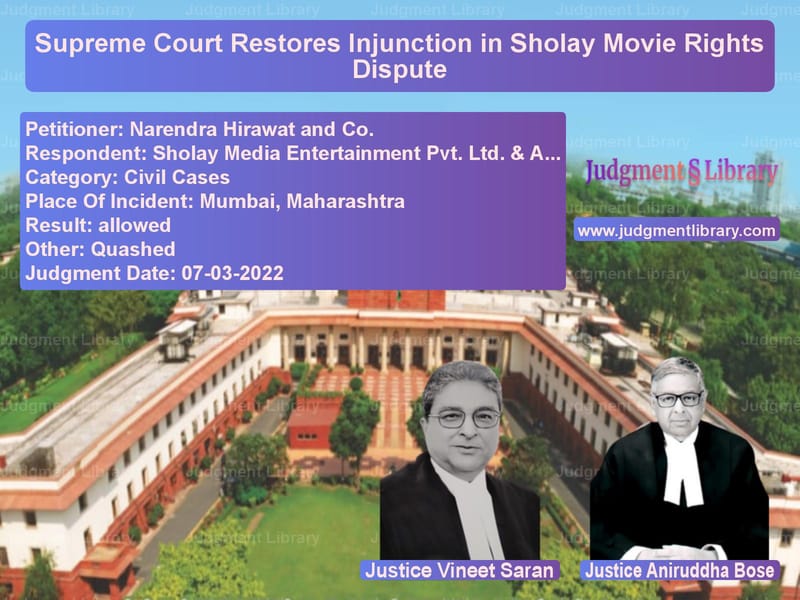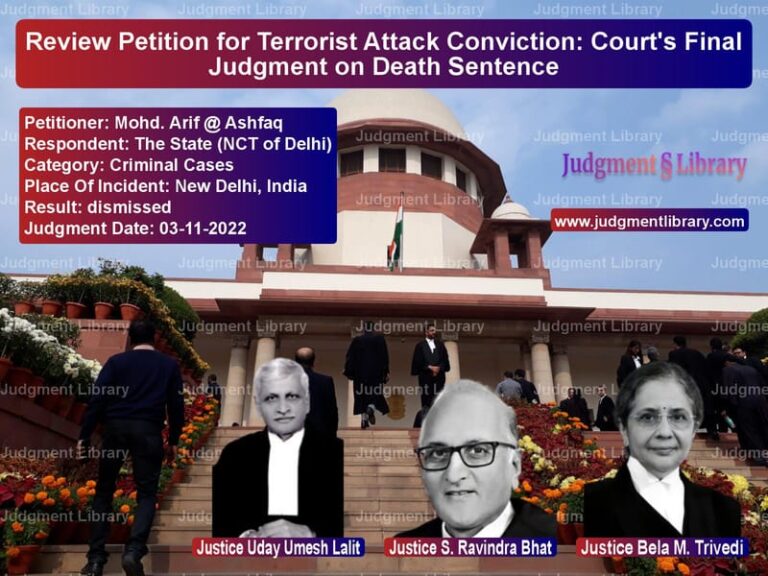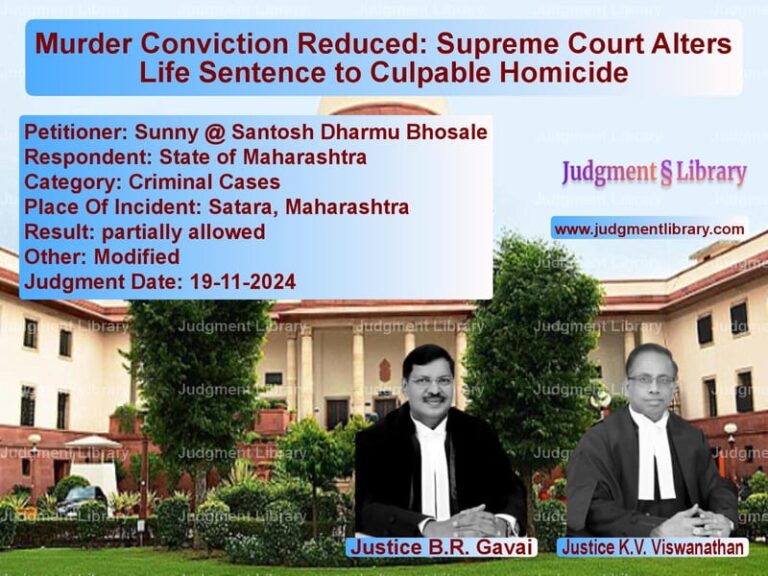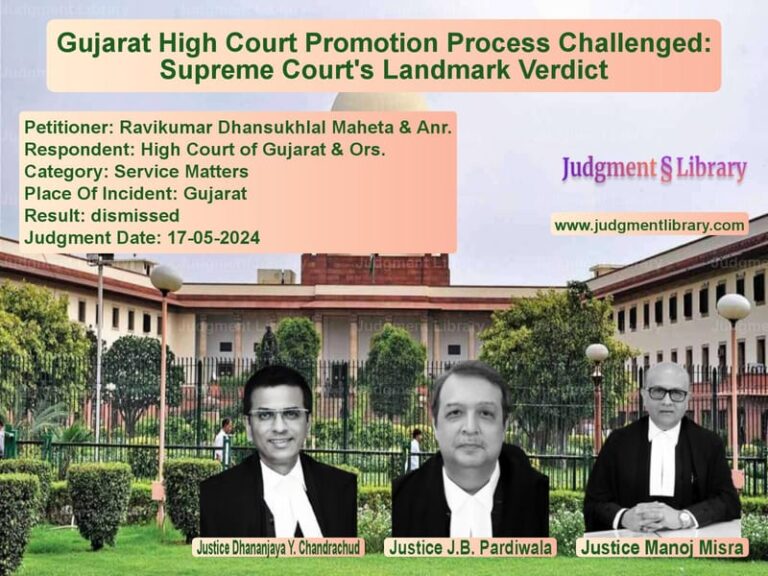Supreme Court Restores Injunction in Sholay Movie Rights Dispute
The case of Narendra Hirawat and Co. vs. Sholay Media Entertainment Pvt. Ltd. & Anr. is a significant ruling concerning intellectual property rights and contractual disputes in the film industry. The Supreme Court’s decision restores the injunction previously granted by a Single Judge of the Bombay High Court, ensuring that the appellant retains their licensed rights over the iconic film “Sholay” and its 3D version.
The case arose out of disputes regarding licensing agreements for “Sholay” and other films, where the appellant, Narendra Hirawat and Co. (NHC), claimed that they had valid rights, while the respondents sought to terminate the agreements due to alleged non-payment. The Supreme Court overturned the Bombay High Court’s Division Bench order that had vacated the injunction, ruling in favor of the appellant.
Background of the Case
The dispute centers around agreements entered into on September 9, 2015, between NHC and Sholay Media Entertainment Pvt. Ltd. (SME). These agreements granted NHC rights over the films “Sholay” and “Sholay 3D” for a period between April 1, 2016, and March 31, 2022, for Rs. 20 crores. Additionally, another agreement granted them rights from April 1, 2022, to March 31, 2027, for Rs. 5 crores.
Subsequently, on May 16, 2018, NHC sub-licensed these rights to Goldmines Telefilms Pvt. Ltd. for the period from November 15, 2021, to November 14, 2026.
However, disputes arose over payments and tax liabilities. To resolve these issues, NHC and SME executed a Deed of Settlement on December 3, 2018, extending the licensing period until September 30, 2028. NHC was required to pay an additional Rs. 8.71 crores in four tranches.
The final dispute leading to the legal battle stemmed from SME’s claim that NHC failed to comply with the settlement terms, prompting SME to issue a termination notice on June 18, 2019. Goldmines Telefilms also terminated its sub-license agreement with NHC on August 26, 2019, demanding a refund.
Arguments Presented by the Petitioner (NHC)
The appellant, NHC, contended:
- They had made substantial payments under the settlement deed.
- The remaining balance was withheld because SME had not issued the necessary invoices, which were required for Goods and Services Tax (GST) compliance.
- The termination notice was illegal and in violation of contractual obligations.
- The Single Judge correctly granted the injunction, preventing SME from acting on the termination notice.
- The Division Bench erred in vacating the injunction, which led to severe business disruptions.
Arguments Presented by the Respondent (SME)
Sholay Media Entertainment Pvt. Ltd. argued:
- NHC had failed to pay the full amount as agreed under the settlement.
- The licensing agreements were determinable contracts and, as per Section 14(d) of the Specific Relief Act, 1963, were not specifically enforceable.
- Their decision to terminate NHC’s rights was legally valid.
- The Division Bench of the High Court had correctly vacated the injunction.
Supreme Court’s Observations and Verdict
The Supreme Court analyzed whether NHC had complied with its payment obligations and whether SME was justified in terminating the contract. The Court made the following key observations:
- NHC had already paid Rs. 5.46 crores under the settlement deed.
- Every prior payment was made only after SME issued invoices, which SME had failed to do for the final installment.
- SME’s justification that issuing invoices would create a tax liability was inconsistent with its past conduct.
- The Single Judge had correctly granted the injunction, as NHC had a prima facie case and had demonstrated readiness to pay.
- The Division Bench erred in interfering with the discretionary relief granted by the Single Judge.
The Supreme Court ruled:
- The appeal was allowed.
- The Division Bench’s order vacating the injunction was set aside.
- The Single Judge’s order granting the injunction was restored.
- The High Court was directed to expedite the suit proceedings and decide the matter within one year.
Legal Precedents Considered
The Supreme Court referred to multiple cases on interim injunctions and contract enforcement:
- Wander Ltd. vs. Antox India (1990): Held that appellate courts should not interfere with discretionary orders unless they are arbitrary.
- Dorab Cawasji Warden vs. Coomi Sorab Warden (1990): Stated that mandatory injunctions should be granted only in exceptional cases.
- Metro Marins vs. Bonus Watch Co. (2004): Reaffirmed the principles governing interim injunctions.
- Colgate Palmolive India Ltd. vs. Hindustan Lever Ltd. (1999): Summarized considerations for granting injunctions.
Impact of the Judgment
This ruling has significant implications for contract enforcement in the entertainment industry:
- It reinforces that licensing agreements must be honored, and terminations must comply with contractual and legal requirements.
- It underscores the importance of issuing invoices for tax compliance in business transactions.
- It sets a precedent that courts should not interfere with well-reasoned injunction orders.
- The decision protects licensees from arbitrary contract terminations that disrupt their business operations.
By restoring the injunction, the Supreme Court has ensured that NHC’s rights remain intact until the final adjudication of the dispute.
Petitioner Name: Narendra Hirawat and Co..Respondent Name: Sholay Media Entertainment Pvt. Ltd. & Anr..Judgment By: Justice Vineet Saran, Justice Aniruddha Bose.Place Of Incident: Mumbai, Maharashtra.Judgment Date: 07-03-2022.
Don’t miss out on the full details! Download the complete judgment in PDF format below and gain valuable insights instantly!
Download Judgment: narendra-hirawat-and-vs-sholay-media-enterta-supreme-court-of-india-judgment-dated-07-03-2022.pdf
Directly Download Judgment: Directly download this Judgment
See all petitions in Contract Disputes
See all petitions in Judgment by Vineet Saran
See all petitions in Judgment by Aniruddha Bose
See all petitions in allowed
See all petitions in Quashed
See all petitions in supreme court of India judgments March 2022
See all petitions in 2022 judgments
See all posts in Civil Cases Category
See all allowed petitions in Civil Cases Category
See all Dismissed petitions in Civil Cases Category
See all partially allowed petitions in Civil Cases Category







